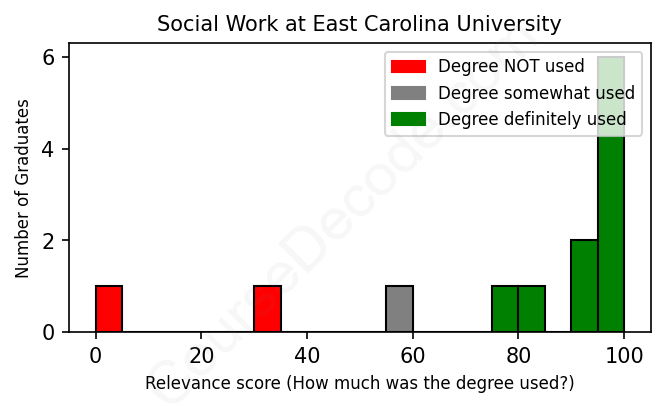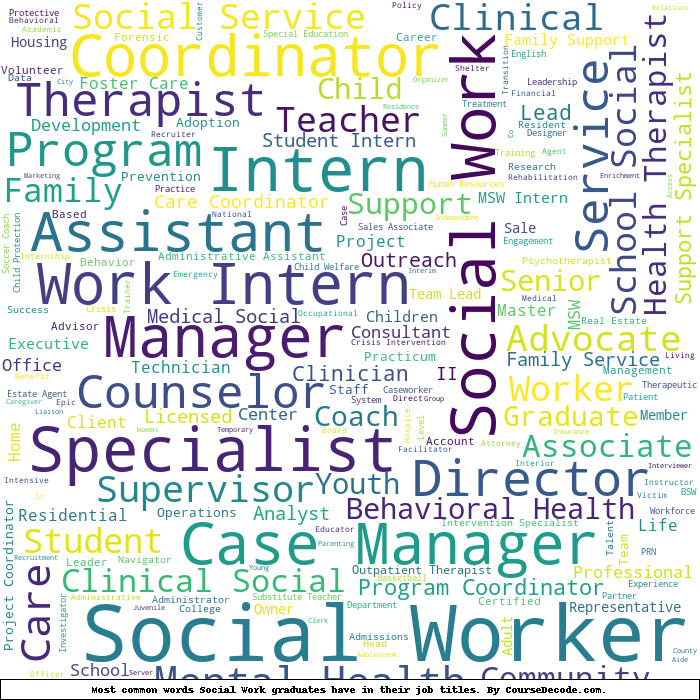
First, some facts. Of the Social Work graduates from East Carolina University we've analyzed , here's how many have used (or NOT used) their degree in their career:

These are estimates based on AI analysis of 13 LinkedIn profiles (see below).
The verdict? Significantly above average. Overall, with an average relevance score of 79%, Social Work graduates from East Carolina University have a much higher likelihood (+12%) of finding work in this field compared to the average graduate across all fields:
And for comparison, here's the chart for all profiles we've looked at across all degrees.
Also, after graduating, 69% of these graduates have pursued further education other than another Bachelor's degree (such as a Masters degree or other), compared to the average across all profiles of 35%. This suggests you may need more than just a Bachelors degree to be competitive as a Social Work graduate.
See the details:
|
Relevance score: 2% We think this person has NOT gone into a career related to their degree. We think this person has NOT gone into a career related to their degree.
DEGREE INFOGraduated in 2019 from East Carolina University with a Bachelor's degree in Social Work. No other secondary education since. JOB HISTORY SINCE GRADUATIONIntern Legal Aid of North Carolina Jan 2019 - May 2019 Current Operations Officer in Charge  US Army May 2019 - Jan 2021 Fire Support Officer  US Army Jan 2021 - Aug 2021 Platoon Leader  US Army Aug 2021 - Present ABOUTWith a diversity through my education and job experience, I have found myself to be a well-rounded individual amongst others. The Army has taught me excellent leadership skills, as well as how to adapt to situations and overcome negativity. As a Park Ranger, I've learned to communicate with the community and keep others safe. |
The top 10 most common jobs done by the graduates we've analyzed (ranked most common to least) are:
From the analysis of LinkedIn profiles of graduates from East Carolina University's Social Work program, it's clear that many individuals have gravitated towards roles that directly harness their degree. The most common positions include Social Worker, Clinical Social Worker, and Case Manager, especially within hospitals and government social services. These roles typically require the application of social work theories, principles, and skills on a daily basis, reflecting a strong alignment with what these graduates studied. For instance, positions like Social Work Case Manager and Behavioral Health Technician make direct use of social work knowledge, emphasizing case management and mental health support, which are fundamental aspects of the field.
On the flip side, not all roles have been as relevant to their degree. Some graduates took on positions like Administrative Support Associate or Customer Service Representative, which don't tap into social work competencies at all. A handful also ventured into legal and administrative fields, showing the versatility of a social work background, even if those specific jobs didn’t directly utilize the core social work skills they learned. Overall, while many have successfully landed jobs that relate closely to social work, there are definitely instances where their degree isn’t being fully utilized, indicating a mix of relevance across various job paths.
Here is a visual representation of the most common words in job titles for Social Work graduates (this is across all Social Work graduates we've analyzed, not just those who went to East Carolina University):

From the information provided, it looks like graduates from East Carolina University's Social Work program tend to follow career paths that are quite relevant to the field, especially in the initial years after graduation. Right off the bat, many of these grads land jobs as case managers, social workers, or in support roles within healthcare and social services organizations. For example, graduates from 2012 and 2014 quickly moved into positions like Social Work Case Managers and counselors, which aligns closely with their degrees. Even some who initially took non-social work roles seem to have redirected their careers back toward social services within a few years. This suggests that while not everyone jumps straight into their ideal role, many do find their way back to the social work field as they gain experience and clarity about their career goals.
Fast forward five to ten years, and many of these professionals have advanced into significant roles within the healthcare and social services landscape. We see individuals progressing from intern positions to clinical roles and managerial positions in social services, such as Hospital Liaisons or Program Managers. This trajectory hints at a positive overall perception of the social work degree, as graduates continue to build on their education and experience over time. On the flip side, there are a few graduates who seem to have drifted away from direct social work roles, taking positions in customer service and even in law-related fields, which might indicate a shift in their interests or challenges in finding suitable positions in social work. However, the majority of the profiles show a promising progression in relevant careers indicative of a solid foundation provided by their degree in Social Work.
Honestly, getting a Bachelor’s degree in Social Work can be a bit of a mixed bag. At East Carolina University, like many places, you’ll find a good mix of challenging courses and some that might be a little easier. It’s definitely not a walk in the park; you’ll need to dive into subjects like human behavior, social policies, and ethics, which can get pretty deep. Plus, there’s often hands-on experience required, like internships, which adds another layer of commitment. So while it might not be the hardest degree out there, it definitely requires dedication and a genuine interest in helping people. Just be ready to put in the effort, and you’ll do fine!
Most commonly, in the LinkedIn profiles we've looked at, it takes people 4 years to finish a Bachelor degree in Social Work.
So, looking at the jobs these East Carolina University Social Work grads have had, it seems like their earnings probably aren’t sky-high, especially when you compare it to fields like business or tech. A lot of them started off with internships or assistant positions, which usually pay less, and many worked case management roles that, while important, typically don't have the biggest salaries in the social services sector. Some have moved into clinical roles, which can pay better, but it might take time to climb that ladder. Overall, while they’re doing meaningful work, it doesn’t seem like they’re raking in the big bucks just yet, but they might find better opportunities as they gain more experience.
Here is a visual representation of the most common words seen in the "about" section of LinkedIn profiles who have a Bachelor degree in Social Work (this is across all Social Work graduates we've analyzed, not just those who went to East Carolina University). This may or may not be useful:

Here are all colleges offering a Bachelor degree in Social Work (ordered by the average relevance score of their Social Work graduates, best to worst) where we have analyzed at least 10 of their graduates: